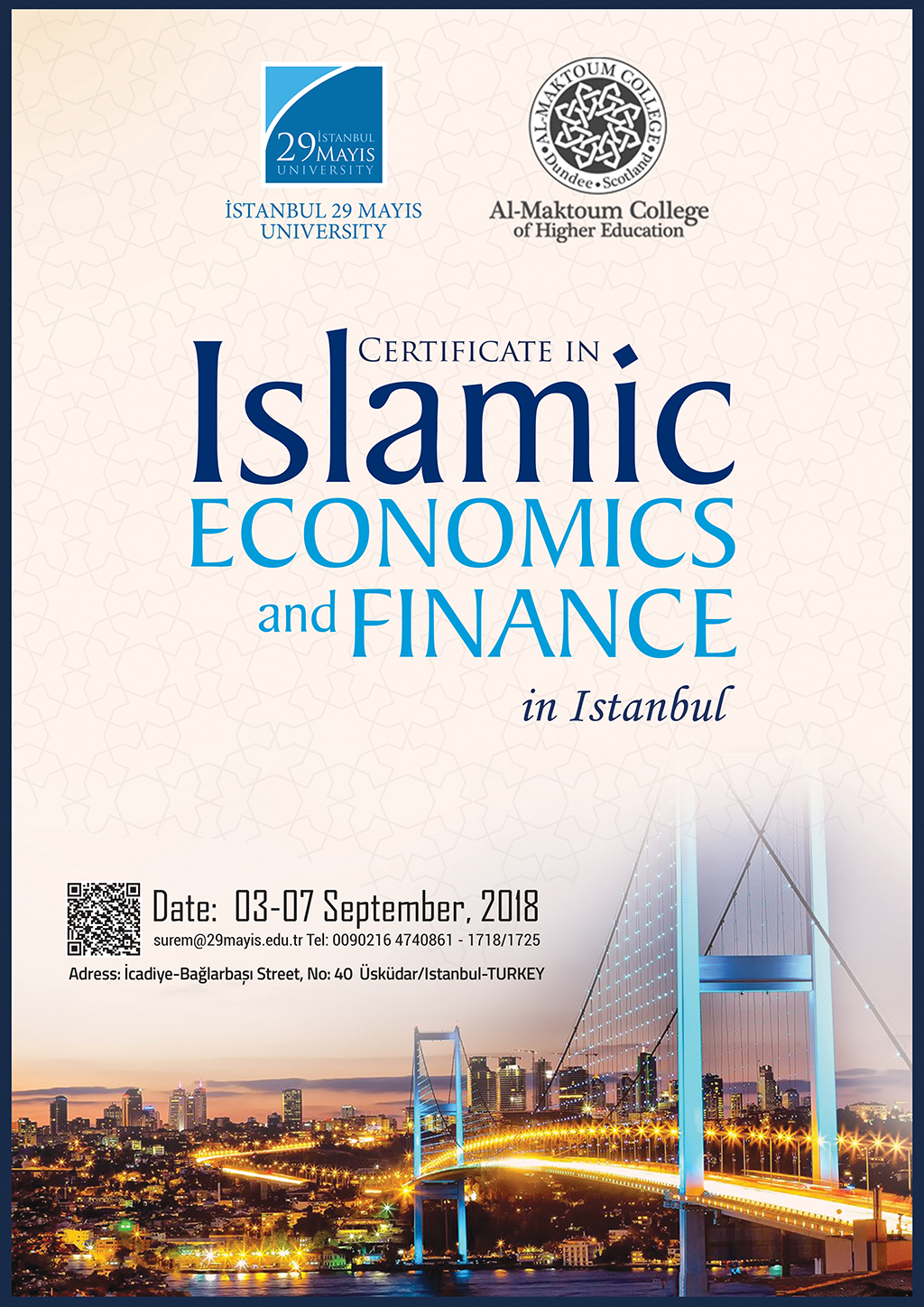

As a result of the financial crisis, there is an increasing need among scholars of economics and those working in the field to identify and understand what Islamic economics is and how it can contribute to the conventional system of finance and multiculturalism. This, of course, poses the questions ‘What is the difference between the concept of “Islamic economics and finance” and that of pure “economics and finance”?’ and ‘Is “Islamic economics and finance” capable of contributing to a secular society?’ The two compulsory units of this programme meet the requirements of those who wish to improve their understanding of key Islamic economics, finance and banking concepts and practices that may have a significant impact on their work. The programme is available on an intensive basis.
The full programme is intended for students who wish to pursue a qualification in the field of Islamic economics, finance and banking. The programme will also promote students’ career development in both the private and public sectors through learning appropriate skills such as critical analysis of different concepts and approaches in specific subjects, networking and teambuilding, communication skills, problem-solving, negotiation and influencing skills and written and oral presentation skills.
Also, this Program offers an introduction to the evolving Islamic financial sector. It will enhance and develop your knowledge of Islamic finance. The program will enable the participants to:
It is intended for:
* Please note that 8% VAT will be added to all fees, for instance, Professional fee is $1080 including VAT.
If you are interested in the programmes, you can apply for the Certificate in Islamic Economics and Finance for online at https://surem.29mayis.edu.tr/egitim/certificate-in-Islamic-economics-and-finance-45.html or you may apply online by clicking here.
|
Applied Islamic Banking and Insurance (AIBI)* Islamic Economics and Finance (IEF)** |
||
Day |
Date |
Time and Lecture Title |
|
1 Monday |
3/9/2018 |
9:30am – 12:30pm (AIBI) |
|
1:30pm – 4:30pm (IEF) |
||
|
2 Tuesday |
4/9/2018 |
9:30am – 12:30pm (AIBI) |
|
1:30pm – 4:30pm (IEF) |
||
|
3 Wednesday |
5/9/2018 |
9:30am – 12:30pm (AIBI) |
|
1:30pm – 4:30pm (IEF) |
||
|
4 Thursday |
6/9/2018 |
9:30am – 12:30pm (AIBI) |
|
1:30pm – 4:30pm (AIBI) |
||
|
5 Friday |
7/9/2018 |
9:30am – 12:30pm (IEF) |
|
1:30pm – 4:30pm (IEF) |
||
*AIBI will be taught by Dr Salah Alhammadi
**IEF will be taught by Dr Harun Sencal
UNIT 1: APPLIED ISLAMIC BANKING AND INSURANCE (15 HOURS)
Unit Coordinator: Dr Salah Alhammadi
UNIT SUMMARY
The growing importance of the Islamic finance industry and the rapid global development of Islamic financial institutions, make it essential that anyone interested in the area of Islamic finance is conversant with the fundamentals, core concepts, and practical operation, control system and regulatory framework of Islamic banking and insurance. The unit will cover the differences between Islamic and western banking and insurance models in terms of conceptual framework, governing principles, governance system, business model, and product level differentiation. It will also cover all aspects associated with Islamic banking and insurance operation, including the embedding of Shari’ah compliance and regulatory frameworks in product development, asset liability management, internal control system, internal and Shari’ah audit as an independent assurance process. The unit will explore how Islamic principles have evolved into structures of products, services, control and governance system in Islamic banking and Takaful industry. The issues of Islamic banking and insurance products and services also will be critically analysed.
AIMS
LEARNING OUTCOMES
On completion of this unit the students should be able to:
GENERAL COURSE PLAN
|
Session |
DATES |
TOPICS |
|
1 |
3/9/2018 9:30 - 12:30 |
Introduction to Islamic Finance. Institutional framework, governing principles, and governance system of Islamic and conventional banking. The business model and products of Islamic Finance |
|
2 |
4/9/2018 9:30 - 12:30 |
Islamic insurance (Takaful) and reinsurance (Retakaful). Why Islamic insurance? |
|
3 |
5/9/2018 9:30 - 12:30 |
Asset-liability management in Islamic banking and insurance. |
|
4 |
6/9/2018 9:30 - 12:30 |
Risk management in Islamic banking and insurance |
|
5 |
6/9/2018 13:30 - 16:30 |
Corporate governance issue within product structures, services in Islamic banking, and Shari’ah governance and Internal Shari’ah control system in Islamic banking. (Practical case study) |
UNIT 2: ISLAMIC ECONOMICS AND FINANCE (15 HOURS)
Unit Coordinator: Dr Harun Sencal
UNIT SUMMARY
The unit will cover the origin, concepts, and aims of Islamic economics, including Islamic finance as practical tool of system of Islamic economics. This unit will also develop an understanding of the history and evolution of Islamic political economy and Islamic moral economy both from Islamic and neoclassical point of views.
It will also cover all aspects associated with Islamic Finance, including the definitions, classifications and nature. Moreover, this unit will discuss the emergent financial institutions such as Islamic FinTech. It will explore how Islamic Finance principles have evolved into structures of products and services. Issues of financial and non-financial products and services also will be considered.
AIMS
LEARNING OUTCOMES
On successful completion of the course, students should be able to:
GENERAL COURSE PLAN
|
SESSION |
DATE |
TOPIC |
|
1 |
3/9/2018 13:30-16:30 |
Background of Islamic Economics and Various Approaches towards Islamic Economics |
|
2 |
4/9/2018 13:30-16:30 |
Islamic Political Economy |
|
3 |
5/9/2018 13:30-16:30 |
Background of Islamic Finance and Current Trends |
|
4 |
7/9/2018 9:30-12:30 |
Islamic Capital Markets |
|
5 |
7/9/2018 13:30-16:30 |
Shari’ah Governance |


As a result of the financial crisis, there is an increasing need among scholars of economics and those working in the field to identify and understand what Islamic economics is and how it can contribute to the conventional system of finance and multiculturalism. This, of course, poses the questions ‘What is the difference between the concept of “Islamic economics and finance” and that of pure “economics and finance”?’ and ‘Is “Islamic economics and finance” capable of contributing to a secular society?’ The two compulsory units of this programme meet the requirements of those who wish to improve their understanding of key Islamic economics, finance and banking concepts and practices that may have a significant impact on their work. The programme is available on an intensive basis.
The full programme is intended for students who wish to pursue a qualification in the field of Islamic economics, finance and banking. The programme will also promote students’ career development in both the private and public sectors through learning appropriate skills such as critical analysis of different concepts and approaches in specific subjects, networking and teambuilding, communication skills, problem-solving, negotiation and influencing skills and written and oral presentation skills.
Also, this Program offers an introduction to the evolving Islamic financial sector. It will enhance and develop your knowledge of Islamic finance. The program will enable the participants to:
It is intended for:
* Please note that 8% VAT will be added to all fees, for instance, Professional fee is $1080 including VAT.
If you are interested in the programmes, you can apply for the Certificate in Islamic Economics and Finance for online at https://surem.29mayis.edu.tr/egitim/certificate-in-Islamic-economics-and-finance-45.html or you may apply online by clicking here.
|
Applied Islamic Banking and Insurance (AIBI)* Islamic Economics and Finance (IEF)** |
||
Day |
Date |
Time and Lecture Title |
|
1 Monday |
3/9/2018 |
9:30am – 12:30pm (AIBI) |
|
1:30pm – 4:30pm (IEF) |
||
|
2 Tuesday |
4/9/2018 |
9:30am – 12:30pm (AIBI) |
|
1:30pm – 4:30pm (IEF) |
||
|
3 Wednesday |
5/9/2018 |
9:30am – 12:30pm (AIBI) |
|
1:30pm – 4:30pm (IEF) |
||
|
4 Thursday |
6/9/2018 |
9:30am – 12:30pm (AIBI) |
|
1:30pm – 4:30pm (AIBI) |
||
|
5 Friday |
7/9/2018 |
9:30am – 12:30pm (IEF) |
|
1:30pm – 4:30pm (IEF) |
||
*AIBI will be taught by Dr Salah Alhammadi
**IEF will be taught by Dr Harun Sencal
UNIT 1: APPLIED ISLAMIC BANKING AND INSURANCE (15 HOURS)
Unit Coordinator: Dr Salah Alhammadi
UNIT SUMMARY
The growing importance of the Islamic finance industry and the rapid global development of Islamic financial institutions, make it essential that anyone interested in the area of Islamic finance is conversant with the fundamentals, core concepts, and practical operation, control system and regulatory framework of Islamic banking and insurance. The unit will cover the differences between Islamic and western banking and insurance models in terms of conceptual framework, governing principles, governance system, business model, and product level differentiation. It will also cover all aspects associated with Islamic banking and insurance operation, including the embedding of Shari’ah compliance and regulatory frameworks in product development, asset liability management, internal control system, internal and Shari’ah audit as an independent assurance process. The unit will explore how Islamic principles have evolved into structures of products, services, control and governance system in Islamic banking and Takaful industry. The issues of Islamic banking and insurance products and services also will be critically analysed.
AIMS
LEARNING OUTCOMES
On completion of this unit the students should be able to:
GENERAL COURSE PLAN
|
Session |
DATES |
TOPICS |
|
1 |
3/9/2018 9:30 - 12:30 |
Introduction to Islamic Finance. Institutional framework, governing principles, and governance system of Islamic and conventional banking. The business model and products of Islamic Finance |
|
2 |
4/9/2018 9:30 - 12:30 |
Islamic insurance (Takaful) and reinsurance (Retakaful). Why Islamic insurance? |
|
3 |
5/9/2018 9:30 - 12:30 |
Asset-liability management in Islamic banking and insurance. |
|
4 |
6/9/2018 9:30 - 12:30 |
Risk management in Islamic banking and insurance |
|
5 |
6/9/2018 13:30 - 16:30 |
Corporate governance issue within product structures, services in Islamic banking, and Shari’ah governance and Internal Shari’ah control system in Islamic banking. (Practical case study) |
UNIT 2: ISLAMIC ECONOMICS AND FINANCE (15 HOURS)
Unit Coordinator: Dr Harun Sencal
UNIT SUMMARY
The unit will cover the origin, concepts, and aims of Islamic economics, including Islamic finance as practical tool of system of Islamic economics. This unit will also develop an understanding of the history and evolution of Islamic political economy and Islamic moral economy both from Islamic and neoclassical point of views.
It will also cover all aspects associated with Islamic Finance, including the definitions, classifications and nature. Moreover, this unit will discuss the emergent financial institutions such as Islamic FinTech. It will explore how Islamic Finance principles have evolved into structures of products and services. Issues of financial and non-financial products and services also will be considered.
AIMS
LEARNING OUTCOMES
On successful completion of the course, students should be able to:
GENERAL COURSE PLAN
|
SESSION |
DATE |
TOPIC |
|
1 |
3/9/2018 13:30-16:30 |
Background of Islamic Economics and Various Approaches towards Islamic Economics |
|
2 |
4/9/2018 13:30-16:30 |
Islamic Political Economy |
|
3 |
5/9/2018 13:30-16:30 |
Background of Islamic Finance and Current Trends |
|
4 |
7/9/2018 9:30-12:30 |
Islamic Capital Markets |
|
5 |
7/9/2018 13:30-16:30 |
Shari’ah Governance |